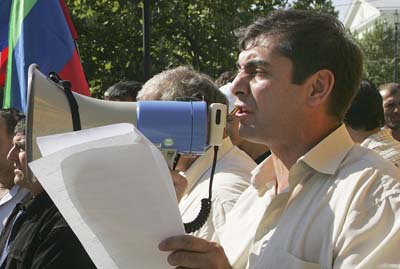New York, December 16, 2011–Russian authorities must carry out an urgent and effective investigation into Thursday night’s assassination of Gadzhimurad Kamalov, founder of the independent weekly Chernovik, which had tackled highly sensitive topics in the southern republic of Dagestan, the Committee to Protect Journalists said today.
A masked assailant apparently lying in wait outside Chernovik‘s Makhachkala offices fired 14 times as Kamalov was leaving work shortly before midnight. Kamalov, 46, a contributing editor and writer for the paper, died en route to a local hospital. A Chernovik staffer who witnessed the murder through an office window told CPJ that the assailant fled the scene in a Lada Priora.
“We mourn the death of our colleague Gadzhimurad Kamalov and send our deepest condolences to his family, friends, and colleagues,” CPJ Europe and Central Asia Program Coordinator Nina Ognianova said. “We call on Russian authorities to launch an independent, thorough, and effective investigation into this brutal murder, and bring all those responsible to justice.”
Chernovik, the most popular newspaper in Dagestan, is known for its independence and courageous coverage of government corruption, human rights abuses, and Islamic radicalism. From 2008 until 2011, Chernovik and five of its journalists, including then-editor and CPJ International Press Freedom Award winner Nadira Isayeva, were subjected to a politically motivated prosecution on trumped-up “extremism” charges stemming from the paper’s critical coverage of regional police and the federal security service. The journalists were acquitted of the charges in May.
Biyakai Magomedov, the current editor of Chernovik, told CPJ that Kamalov had not disclosed recent threats. But a family member told the regional news website Kavkazsky Uzel that threats had been commonplace since the paper was launched in 2003. “Since the time Chernovik started publishing, there have been a number of threats, and he had foes,” Khadzhimurad Radzhabov, a cousin and colleague of Kamalov, told Kavkazsky Uzel.
In recent television interviews, Kamalov had made critical comments about alleged regional government corruption. “Dagestan is sinking into idleness, into misguided scattering of federal money,” Kavkazsky Uzel quoted Kamalov as saying in a February interview with the national television channel NTV. “You would not see a single place in Russia with a bigger quantity of restaurants, banquet halls, saunas, casinos, and hookah parlors as Makhachkala.”
Kamalov’s name was among 16 included on a “death list” published anonymously and distributed in the form of a handout in Makhachkala in September 2009, according to Russian press reports. The handout, which named eight journalists among its targets, called for “destruction of the bandits and revenge for police officers and peaceful citizens.”
The North Caucasus region, of which Dagestan is part, constitutes Russia’s most dangerous assignment for journalists. Of the 20 journalists murdered in the country since 2000, seven were assassinated in the North Caucasus. Four of those seven were in Dagestan. All seven cases remain unsolved. The culture of impunity has led to a massive information vacuum for independent information from and about the volatile region.
